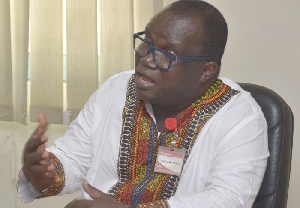Data compiled by the Ghana Chamber of Telecommunications shows that over 18 million subscribers experienced poor service quality within the first quarter of 2019 due to incidents of fibre cuts and theft at base stations of telecommunication companies.
According to the mobile industry association, over 2,000 incidents of fibre cuts were recorded in the first quarter of this year.
In addition, 600 incidents of theft of cables, fuel and batteries took place at base stations, as well as destruction of the infrastructure of telecommunication companies.
Chief executive of the Chamber, Ing. Kenneth Ashigbey explained that the unfortunate happenings were affecting quality of service, general social and economic activity, security and customer experience across the country.
“The persistent nature of the cuts and damage to infrastructure affect operations and threatens the long-term sustainability of the mobile technology ecosystem, upon which Ghana’s digitisation agenda relies heavily on in delivering a formal, smart economy and connected society for Ghanaians,” he added.
He said the fibre cuts, which were caused mainly by private developers, road contractors, unknown criminals and other utility providers, cost the industry over GH¢30 million in direct repairs only.
He noted that the cost was without counting the cost of loss of revenue, the non-traditional temporary solutions deployed, as well as additional capital expenditure to keep network availability stable.
He added that over 150,000 litres of diesel and 240 batteries were stolen from cell sites, with a whooping 18 million subscribers and businesses affected within the value chain.
“The data gathered speaks to the enormous problem that service providers are faced with; where limited funds are being expended on repairs of cuts and replacement of equipment as against expanding the network to enhance quality, reach and experience for customers.
“The service providers have to deploy extra meshed networks to provide additional redundancies to ensure that the over 300 cuts being experienced per month currently does not impact more than 25% of the network.
“We cannot continue to accept this menace as a norm, and we are working assiduously to reach all partners and stakeholders who work within the Right of Way (RoW) across the country to agree modalities to reduce, if not eradicate, the menace,” Ashigbey added.
In the light of this development, he said the chamber was embarking on a sensitisation outreach in four main regions where reports of cable thefts, cuts and damage are rampant, to build awareness towards enforcement.
This engagement would seek to bring together stakeholders from the road agencies, road contractors, utility service providers, local government, regulators and others who work within the reservations or play critical roles in its management.
Attendees will work together to build action plans towards effective collaboration and better co-ordination within the right of ways while preserving each other’s infrastructure.
The workshops will engage with security teams within the regions to ensure criminals who tamper with telecommunications infrastructure are dealt with in accordance with the law.
Section 77 of the Electronic Communications Act 2008 (Act 775) undoubtedly makes fibre optic cable cut and damage to communications infrastructure a criminal offence, to which offenders are liable to summary conviction to a fine of not more than 3,000 penalty units or to a term of imprisonment of not more than five years, or both.
The chamber entreated the general public to be vigilant of suspicious persons who access the Right of Way, culverts fitted with underground cables and base station facilities without permits or visibly branded outfits.
It asked the general public to inform the law enforcement authorities or call any mobile network operator to report as their activities affect service and compromise security in the long term.
The first sensitisation outreach will be held on Thursday, June 27, 2019 in Cape Coast.
Business News of Tuesday, 25 June 2019
Source: thefinderonline.com













